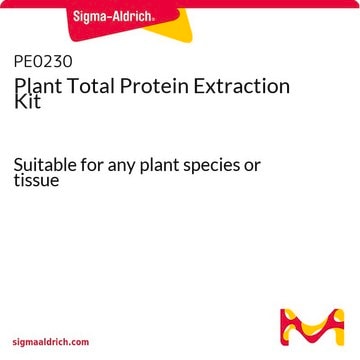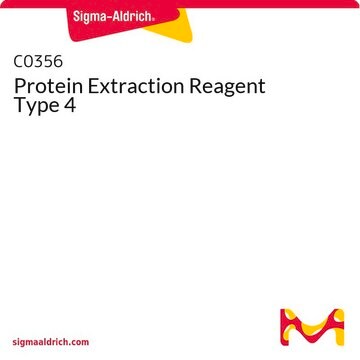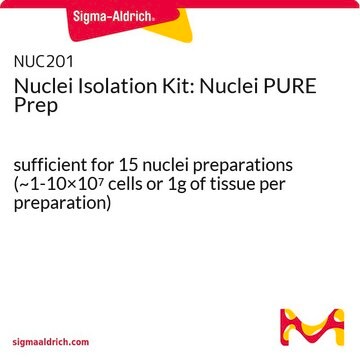Wichtige Dokumente
PE0240
Plant Fractionated Protein Extraction Kit
Suitable for any plant species or tissue
About This Item
Empfohlene Produkte
Allgemeine Beschreibung
Following removal of polyphenolics, tannins and other interfering substances, ground plant tissue, fresh or frozen, is resuspended in a specially formulated reagent to extract hydrophilic proteins. After sequential extractions of hydrophilic proteins, addition of the chaotropic reagent provided extracts hydrophobic membrane bound proteins. Plant debris is pelleted by centrifugation and protein extract solutions are collected. The end results are qualitative fractionated protein samples, ready for downstream proteomic analysis.
Kit-Komponenten auch einzeln erhältlich
- Plant Protein Extraction Reagent Type 1 1 bottle
- C0356Protein Extraction Reagent Type 4 1 bottleSDB
- P9599Protease Inhibitor Cocktail, for plant cell and tissue extracts, DMSO solution 3 x 1SDB
- T7567Tributylphosphine solution, 200 mM (in N-methyl-2-pyrrolidinone), liquid 3 x 0.5SDB
- A3221Iodoacetamide, Single use vial of 56 mg 3 vial(s)SDB
Signalwort
Danger
Gefahreneinstufungen
Acute Tox. 3 Oral - Aquatic Chronic 2 - Carc. 2 - Eye Dam. 1 - Repr. 1B - Resp. Sens. 1 - Skin Corr. 1A - Skin Sens. 1 - STOT SE 3
Zielorgane
Respiratory system
Lagerklassenschlüssel
6.1C - Combustible acute toxic Cat.3 / toxic compounds or compounds which causing chronic effects
Analysenzertifikate (COA)
Suchen Sie nach Analysenzertifikate (COA), indem Sie die Lot-/Chargennummer des Produkts eingeben. Lot- und Chargennummern sind auf dem Produktetikett hinter den Wörtern ‘Lot’ oder ‘Batch’ (Lot oder Charge) zu finden.
Besitzen Sie dieses Produkt bereits?
In der Dokumentenbibliothek finden Sie die Dokumentation zu den Produkten, die Sie kürzlich erworben haben.
Kunden haben sich ebenfalls angesehen
Unser Team von Wissenschaftlern verfügt über Erfahrung in allen Forschungsbereichen einschließlich Life Science, Materialwissenschaften, chemischer Synthese, Chromatographie, Analytik und vielen mehr..
Setzen Sie sich mit dem technischen Dienst in Verbindung.














